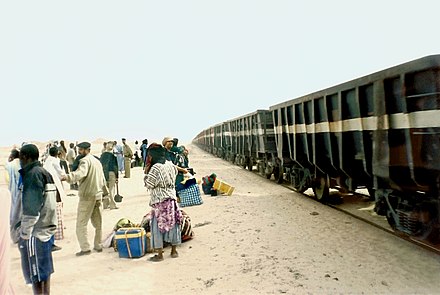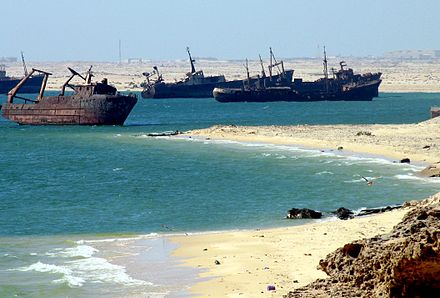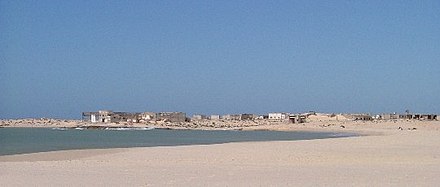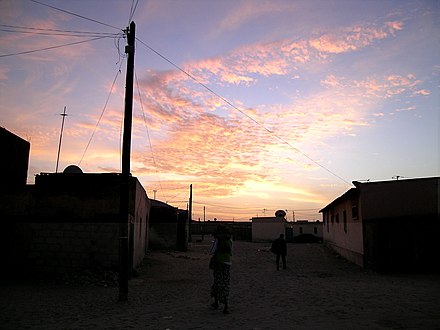Nouadhibou is the second largest city in Mauritania. It's a major fishing centre and large industrial port.
Understand
 A key economic centre, it's home to roughly 90,000 people. Before independence, the city was called Port Etienne by the French colonists after the first boat which arrived here, the Tienne. Since independence in 1960, it has been called Nouadhibou, which means Place of the Jackal. Many jackals used to come and drink water in a well. The town's three main parts are:
A key economic centre, it's home to roughly 90,000 people. Before independence, the city was called Port Etienne by the French colonists after the first boat which arrived here, the Tienne. Since independence in 1960, it has been called Nouadhibou, which means Place of the Jackal. Many jackals used to come and drink water in a well. The town's three main parts are:
- Cansado: Means tired in Spanish. This area is about 10 km from Keran. It was built by the French in 1960, for the workers of the SNIM mining company. It has a nice hotel, tennis courts and petanque grounds.
- Keran: The city centre was built in 1958. The central police, customs, banks, office supply and central market are here.
- Numerowatt: Starts with the area of Socogim and is divided into 6 water taps (French: robinets). It was built in 1982-83. The water comes from an underground lake in Boulenoir, about 90 km from here. The pipes were laid in 1960. The district is growing rapidly. Most of the population lives here.
In 1990, the tarmac road from Keran to Numerwatt was built; a distance of about 13 km. In 2000, the city centre roads were paved and Internet and mobile phones arrived.
In 2005, the highway between Nouadhibou and Nouakchott was completed. There is now a clean half-way stop at the 235-km mark built by a Moroccan business where you can get a fresh cup of coffee and tasty sandwiches as well as a tajine, a meat stew. They also have separate toilets for men and women, and a simple tyre changing shop. Nearby is the entrance to the Banc d'Arguin national park.
Nouadhibou without SNIM or fishing would not be the same. SNIM, the Société Nationale Industrielle et Minière, is the biggest company in Mauritania. The iron began being mined in the 1960s when they began building the railway which carries one of the longest trains in the world (2 km). Passengers can pay to sit inside a rail carriage or ride for free on top, which is quite the ride.
The other economic engine is the fishing industry. There are 3 ports: a commercial port (Port Autonome), a local fishing port (Port Artisanal) and the private SNIM port at Cansado for iron export. If you like salty air, sea food and fish, checking out the Port Artisanal can be a treat.
Climate
<br clear="right" />Get in

By plane
- Nouadhibou International Airport (IATA: NDB), 20.929184°, -17.033492°. Mauritania Airways flies several times a week between Nouakchott and Nouadhibou as well as from Gran Canaria, from where Bintar Canarias also has 1-2 flights per week (around €440 per round-trip) (July 2021).
If you need a visa on arrival (€55 for EU citizens), turn to the right before entering the passport control building. Right next to the departure waiting lounge there is a small office where the visa is issued. Don't let others jump the queue.
By taxi
From Nouakchott, 470 km away there are frequent collective taxis (Mercedes taking 6 passengers). Prices start from 4500 ougiyas. From Nouadhibou ask for the official taxi station, the Gare Routiere at the town entrance, in Robinet 6. At the first roundabout coming in, turn left and it's 300 m on your left. Taxis like to leave at first light.
From Dakhla in Western Sahara there are collective taxis (11,000 ougiyas) and minibuses (8,000 ougiyas).
By car
There are two sealed roads to Nouadhibou. One connects it with the capital, Nouakchott. The other one goes to the border and further into Western Sahara. There is a 3-km unsealed part between the borders, but it can be passed by a 2WD car without any problems. This is a no-man's land, policed by neither bordering country. Avoid making deals with anyone you might meet there.
Cars and sept-places run from the garage at the exit from town, near the train station. To Nouakchott - from 4,000 ougiya per person in a Mercedes (470 km, about 6 hours).
Due to incidents, foreigners going overland have been advised to travel in groups during daylight hours only.
By bus
There are no regular bus connections from outside of the country, however Supratours runs a bus from Marrakech to the Mauretanien border from where is it possible to arrange independent transport. See Mauritania/Get in.
Between Nouadhibou and Nouakchott, however, there are at least five bus lines that provide daily runs. Most leave about 16:00-17:00 and arrive in the capital between 22:00-23:00. A few bus lines now have mid-day runs which begin around 11:00 to 13:00. Prices range from 3,000-4,500 ougiyas. Some of the better known bus companies are:
- El-Bouragh, across from the Nouadhibou airport.
- Global, on the lower road across the street from the FM radio station.
- Al-Moussavir leaves around 11:00 and is within sight of the As-Salaam bus line on the main middle road leaving town.
- As-Salaam, on the middle main road near the 5th Robinet.
- Somatir, at Robinet 3, uses air-conditioned 20-seater Mercedes mini-vans.
- Sonef bus line leaves at 12:00 for Nouakchott. It is 200 m on the left from the last roundabout leaving town.

By train
There is only one train line in Mauritania, connecting Nouadhibou to Choum and Zouerat. It is used to carry iron ore from Zouerat mines to Nouadhibou port. Only one passenger car is attached to one of these trains daily in each direction. There is no strict timetable, but the passenger car typically departs Nouadhibou around 15:00. Tickets for the passenger car to Choum cost 250 ouguiya but it's usually overcrowded. Travel in an ore hopper is possible and free. However, a scarf or other face cover is necessary, as there is lots of dust. The ore is not very dirty stuff. Be careful aboard the train as it lurches violently when accelerating or braking.
Notice that the new railway station is located north of city centre.
- Nouadhibou railway station (Gare des voyageurs Nouadhibou), 21.0072°, -17.0318°. 2022-01-15
Get around
The city centre can be walked in under 15 minutes, so take a walk-about and see the sights.
Taxis are amazingly cheap, easy to get and everywhere. Taxi to the train station should cost around 300 ougiyas per person when it's full. One way taxi fares on the main roads in town are between 80 and 100 ougiyas. Taxis from the city centre to the Port Autonome area or Cansado are an additional 100 ougiyas. Two passengers are expected to fit in the front passenger seat and four passengers in the back seat. Should a woman get in the car, men may be asked to move to help her maintain an appropriate distance.
See


- Fishing harbour with Senegal boats. Also, there are many shipwrecks in the Nouadhibou Bay. The biggest and most recent shipwreck lies at the tip of the peninsula.
- At the absolute southernmost tip of the same peninsula, there is a small national park, where for a small fee you can observe the meeting point between the bay and the Atlantic Ocean. The point is home to several monk seals. Some of them have been aggressive, so keep a safe distance.
- Between the Port Autonome and Cansado are the ruins of an old French coastal gun emplacement designed in its day to protect the French colony from the Spanish border a few kilometres away. There is no fee and no guide. There are underground tunnels which connect the 15-m-high gun towers. Some tunnels drop off dangerously! A torch or flashlight is helpful.
- You might be tempted to visit the old Spanish buildings at the little town of La Guera on the southern peninsula. They are not in Mauritania, but in Western Sahara, a disputed territory just to the west of Mauritania, so exploring the historic site requires a border crossing. There is a Mauritanian military post nearby. If interested, check with local authorities first.
- The downtown market, in Keran, behind the main middle road, is full of little shops selling a surprising variety of things from all over the world. It has a well stocked chep-chep or second-hand market. You can find prizes for next to nothing.
Do
.jpg/440px-FC_Nouadhibou_at_Nouakchott_Olympic_Stadium_(5786408165).jpg)
- Bird watchers can visit the salt marsh estuary next to the bay. It will be on the left as one heads towards the Centre de Pêche. There is occasionally a police check point at the green shipping container on the way there.
- Fishing for sea trout with spoons or squid can be exciting on the bay. There is a pier at the Centre de Pêche. Look for higher tides for better results. The hotel has a couple of boats to either take people out fishing (you can rent fishing gear as well) or to ferry small groups to a picnic island on the far side of the bay. There is a small cabin structure to shelter you from the often intense sun. Many pelicans and other large sea birds sun themselves on this sandy stretch. The centre has a restaurant with a children's playground. They serve a fresh grilled sea trout and local tea (Arabic: Ataya).
- Those with kiteboards can take advantage of the steady brisk winds wafting across Nouadhibou bay virtually year round. The bay extends almost 20 kilometres from its northern tip to the Ras Nouadhibou. The shallower small craft portion is much smaller, about 10 km wide. Often the water is only a few meters or less in depth, clear and temperate. Online weather services can provide daily tide and wind details.
- If you have your own fishing equipment and four wheel drive, there are several places to fish on the very southern tip of the peninsula, known as Cap Blanc, to the right of the SNIM port/refinery facilities. It's wise to go with a local friend as there can be security check points, it's a fairly remote spot and is extremely close to the Moroccan border. Long traces having 2 or more hooks with a heavy lead weight are best for surf cast fishing. If you have a boat, there are Southern Meager (French: Corbine) to be had in deeper waters. They can reach 50 kg.
- For young sporting types, there are informal and formal football matches in an indoor size format at the Club Sahel. It's on the lower road not far from the Casa Canaria restaurant. There is a fee or just enjoy the great play. Most matches begin in the late afternoon and early evening well into the night.
- Spend a relaxing afternoon reading a novel or catching up on the latest news at the Alliance Franco Mauritanienne. They have gardens and trees, a rarity in Nouadhibou. It's behind the Central Bank, which is in front of the Governor's (Arabic: Waly) offices. Most of their material is in French. Their telephone is +222 574 58 71.
Buy
 The four largest supermarkets are:
The four largest supermarkets are:
- Carrefour, at the first intersection of the city centre.
- Bon Marché
- 28 Novembre
- the Cansado grocery store.
The first three stores are on the main street within 200 metres of each other. Bon Marché and 28 Novembre face each other. You can find most things including cheese and toiletries. Prices are sometimes a bit expensive. Local corner grocery stores, good épiceries, may have everything you need. The market carries fresh vegetables as well as meat and fish. Staples, such as sugar, rice, milk, bread, yoghurt, insect spray, toilet paper, bleach and soap powder are available in local corner shops or boutiques. Hamburger meat and beef fillet are sold at the Tunisian butcher across the street from 28th Novembre.
Several banks in town have ATMs that accept foreign cards. Société generale bank Atms take Mastercard /visa card. There's a decent Forex or bureau de change at the entrance to Keran, the city centre, at the Carrefour crossroads. Ask for a receipt to avoid any problems crossing the borders next time you cross. They will photocopy your passport along with the receipt. Officially, you should not take ougiyas currency out of the country, although small amounts usually aren't a problem.
Should you need help with your vehicle, look for El-Veteh Siddaty et Freres, a well known car parts store in Keran. Their manager speaks English and French and can help you find specialised mechanics such as for electrical problems. Their telephone is +222 574 5739. There are many other similar shops nearby.
Eat
As Nouadhibou has a big commercial fishing and traditional fishing port, there is a lot of fresh seafood and fish available. Many immigrants from Senegal have restaurants here, serving fish with rice and other delicious meals. Average price is 200-500 ougiyas. If you like Chinese food, there are several restaurants on the lower road, which cater to foreigners.
For football, the FC Nouadhibou restaurant serves hamburgers, French fries and other hot sandwiches in front of several large TV screens. It's between the second and third robinets on the middle road.
- La Paillotte, 212, Blvd Maritime (inside Hotel Mauritalia), +222 45743218. One of the current hot spots to eat out is this Italian restaurant, which has a new Spanish chef- Entrees from 2,000 ougiyas
- Nomada. Serving European cuisine
- Pleine de Lune. Serves small snacks, cakes, pastries, mini pizzas, meat rolls and sandwiches. A chicken sandwich is 700 ougiyas.
Drink
- Fresh camel milk. At the entrance to town where large camel herds are gathered. Herders often sell fresh milk close to evening time. It's amazingly refreshing on a hot day.
Sleep

Camping
- Camping Abba. 3000 ougiyas
- Camping Sahara. 2200 ougiyas
- Inal Camping Auberge, +222 643-1728, +222 671-5506. Good parking for larger vehicles or caravans and more rooms for bigger groups.
Budget
- Auberge Sahara. South of city centre, has passable rooms with clean shared toiled and shower from 2,500 ougiyas.
- Camping Baie du Lévrier. Possibly the best known inn (auberge). Rooms are small but clean. It's close to in the centre. It's 200 metres from the central police station and Pleine de Lune sandwich/snack shop, 10 metres from a petrol station and boutique. 500 new ougiyas (double)
Mid-range
- Hotel El-Aljazeera, 20.924521°, -17.041142°. Many rooms.
- Hotel Sahel, Blvd Maritime, 20.922426°, -17.041915°, +222 5743858. Check-in: anytime, check-out: before noon. Well known, international standard hotel. From €50
- The Oasean Hotel, 20.850677°, -17.032962°. A more upmarket hotel with restaurant, tennis courts and beautiful ocean side view. It is one of the oldest hotels in town.
Stay safe
 Nouadhibou is a relatively safe city, but there are almost no street lights. Remember to take a torch when going out in the evening.
Nouadhibou is a relatively safe city, but there are almost no street lights. Remember to take a torch when going out in the evening.
The biggest danger is undisciplined road traffic. Be careful, especially in the central area.
Do not cross the train tracks as many areas, even fairly close to the city centre, have not yet been cleared of mines. Only surfaced roads past the tracks are absolutely safe. If you must cross the tracks, or do so with a trusted friend who knows the area or with a local authority.
Women generally stay indoors after dark. Going about town in groups is wise for both men and women. Local women are usually escorted by their male relatives at night. During the day, a woman will go about with at least a younger boy or another female friend. It's unusual to find a woman travelling by herself. As in any modern city, stay in places that have night security personnel and lockable doors and windows.
Parts of the city also has a reputation for prostitution, which is illegal in Mauritania.
Go next
If you need professional travel services, there are several good ones in the central area.